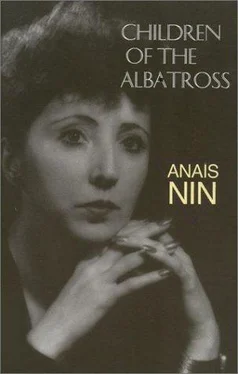Anaïs Nin - Children of the Albatross
Здесь есть возможность читать онлайн «Anaïs Nin - Children of the Albatross» весь текст электронной книги совершенно бесплатно (целиком полную версию без сокращений). В некоторых случаях можно слушать аудио, скачать через торрент в формате fb2 и присутствует краткое содержание. Год выпуска: 1959, ISBN: 1959, Издательство: Swallow Press, Жанр: Классическая проза, Эротические любовные романы, на английском языке. Описание произведения, (предисловие) а так же отзывы посетителей доступны на портале библиотеки ЛибКат.
- Название:Children of the Albatross
- Автор:
- Издательство:Swallow Press
- Жанр:
- Год:1959
- ISBN:9780804000390
- Рейтинг книги:4 / 5. Голосов: 1
-
Избранное:Добавить в избранное
- Отзывы:
-
Ваша оценка:
- 80
- 1
- 2
- 3
- 4
- 5
Children of the Albatross: краткое содержание, описание и аннотация
Предлагаем к чтению аннотацию, описание, краткое содержание или предисловие (зависит от того, что написал сам автор книги «Children of the Albatross»). Если вы не нашли необходимую информацию о книге — напишите в комментариях, мы постараемся отыскать её.
Children of the Albatross — читать онлайн бесплатно полную книгу (весь текст) целиком
Ниже представлен текст книги, разбитый по страницам. Система сохранения места последней прочитанной страницы, позволяет с удобством читать онлайн бесплатно книгу «Children of the Albatross», без необходимости каждый раз заново искать на чём Вы остановились. Поставьте закладку, и сможете в любой момент перейти на страницу, на которой закончили чтение.
Интервал:
Закладка:
The walls of the rooming house were very thin, and he could hear all that took place in the other rooms.
This morning he awakened to a clear duet between a man and a woman.
Man: It’s unbelievable, we’ve been together six years now, and I still have an illusion about you! I’ve never had this as long with any woman.
Woman: Six years!
Man: I’d like to know how often you have been unfaithful.
Woman: Well, I don’t want to know how many times you were.
Man: Oh, me, only a few times. Whenever you went away and I’d get lonely and angry that you had left me. One summer at the beach…do you remember the model Colette?
Woman: I didn’t ask you. I don’t want to know.
Man: But I do. I know you went off with that singer. Why did you? A singer. I couldn’t make love to a singer!
Woman: But you made love to a model.
Man: That’s different. You know it’s not important. You know you’re the only one.
Woman: You’d think it was important if I had.
Man: It’s different for a woman. Why? Why did you, what made you go with that singer, why, when I love you so much and desire you so often?
Silence.
Woman: I don’t believe we should talk about this. I don’t want to know about you. (Crying.) I never wanted to think about it and now you made me.
Man: You’re crying! But it’s nothing. I forgot it immediately. And in six years only a few times. Whereas you, I’m sure it was many times.
Woman: (still crying) I didn’t ask you. Why did you have to tell me?
Man: I’m just mo sincere than you are.
Woman: It isn’t sincerity, it’s revenge. You told me just to hurt me.
Man: I told you because I thought it would drive you into being honest with me.
Silence.
Man: How obstinate you are. Why are you crying?
Woman: Not over your unfaithfulness!
Man: Over your own then?
Woman: I’m crying over unfaithfulness in general—how people hurt each other.
Man: Unfaithfulness in general! What a fine way to evade the particular.
Silence.
Man: I’d like to know how you learned all you know about love-making. Who did you learn from? You know what very few women do.
Woman: I learned…from talking with other women. I also have a natural gift.
Man: I suppose it was Maurice who taught you the most. It enrages me to see how much you know.
Woman: I never asked you where you learned. Besides, it’s always personal. Each couple invents their own way.
Man: Yes, that’s true. Sometimes I made you cry with joy, didn’t I?
Woman: (crying) Why do you use the past tense?
Man: Why did you go off with that singer?
Woman: If you insist so much I will tell you something.
Man: (in a very tense voice) About the singer?
Woman: No, someone else. Once I tried to be unfaithful. You were neglecting me. I took rather a fancy to someone. And all might have gone well except that he had the same habit you have of starting with: you have the softest skin in the world. And when he said this, just as you do, I remembered your saying that, and I left the man, I ran away. Nothing happened.
Man: But just the same he had time to note the quality of your skin.
Woman: I’m telling you the truth.
Man: You have nothing to cry about now. You have taken your revenge.
Woman: I’m crying about unfaithfulness in general, all the betrayals.
Man: I will never forgive you.
Woman: Once in six years!
Man: I’m sure it was that singer.
Faustin, lying down, smoking as he listened, felt the urgent need to comment. He knocked angrily on the wall. The man and the woman were silent.
“Listen,” he said, in his loudest voice, “I heard your entire conversation. I would say in this case the man is very unjust and the woman right. She was more faithful than the man. She was faithful to a personal emotion, to a personal rite.”
“Who are you?” said the man in the other room, angrily.
“No one in particular, just a neighbor.”
There was a long silence. Then the sound of a door being closed violently. Faustin heard one person moving about with soft rustles. Judging from the steps, it was the man who had gone out.
Faustin lay down again, meditating on his own anxiety.
He felt at this moment like a puppet, but he became aware that all this had happened many times before to him, but never as clearly.
All living had taken place for him in the other room, and he had always been the witness. He had always been the commentator.
He felt a guilt for having listened, which was like the guilt he felt at other times for never being the one in action. He was always accompanying someone to a marriage, not his own, to a hospital, to a burial, to a celebration in which he played no part but that of the accompanist.
He was allowing them all to live for him, and then articulating a judgment. He was allowing Jay to paint for him, and then he was the one to write ironic articles on his exhibits. He was allowing Sabina to devastate others with her passion, and smiling at those who were consumed or rejected. Now at this moment he was ashamed not to be the one consumed or rejected. He allowed Djuna to speak, Michael to face the tragic consequences of his deviations in love. He was allowing others to cry, to complain, to die.
And all he did was to speak across a protective wall, to knock with anger and say: you are right, and you are wrong.
Rendered uneasy by these meditations, he dressed himself and decided to go to the cafe.
He was called Uncle Philip by everyone, even by those who were not related to him.
He had the solicitous walk of an undertaker, the unctuous voice of a floorwalker.
His hands were always gloved, his heels properly resoled, his umbrella sheathed.
It was impossible to imagine him having been a child, or even an adolescent. It was admitted he possessed no photographs of that period, and that he had the taste never to talk about this obviously nonexistent facet of his personality. He had been born gray-haired, slender and genteel.
Attired in the most neutral suit, with the manners of someone about to announce a bereavement, Uncle Philip nevertheless did not fulfill such threats and was merely content to register and report minutely on the activity of the large, colorful, international family to which he was related.
No one could mention a country where Uncle Philip did not have a relative who…
No one could mention any world, social, political, artistic, financial, political, in which Uncle Philip did not possess a relative who…
No one ever thought of inquiring into his own vocation. One accepted him as a witness.
By an act of polite prestidigitation and punctuality, Uncle Philip managed to attend a ceremony in India where one of the members of the family was decorated for high bravery. He could give all the details of the function with a precision of colors resembling scenes from the National Geographic Magazine.
And a few days later he was equally present at the wedding of another member in Belgium, from which he brought back observations on the tenacious smell of Catholic incense.
A few days later he was present as godfather of a newborn child in Hungary and then proceeded to attend in Paris the first concert of importance given by still another relative.
Amiable and courteous as he shared in the backstage celebrations, he remained immune to the contagion of colors, gaiety and fame. His grayness took no glow from the success, flowers, and handshakes. His pride in the event was historical, and shed no light on his private life.
Читать дальшеИнтервал:
Закладка:
Похожие книги на «Children of the Albatross»
Представляем Вашему вниманию похожие книги на «Children of the Albatross» списком для выбора. Мы отобрали схожую по названию и смыслу литературу в надежде предоставить читателям больше вариантов отыскать новые, интересные, ещё непрочитанные произведения.
Обсуждение, отзывы о книге «Children of the Albatross» и просто собственные мнения читателей. Оставьте ваши комментарии, напишите, что Вы думаете о произведении, его смысле или главных героях. Укажите что конкретно понравилось, а что нет, и почему Вы так считаете.












